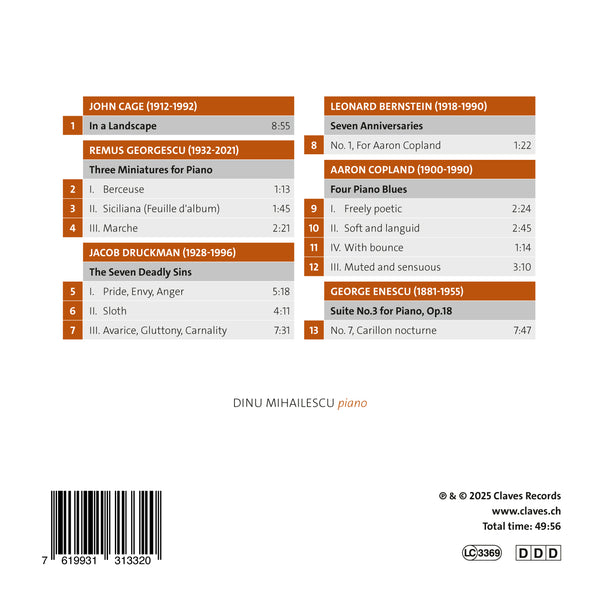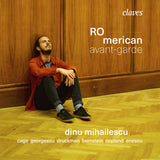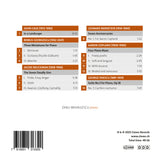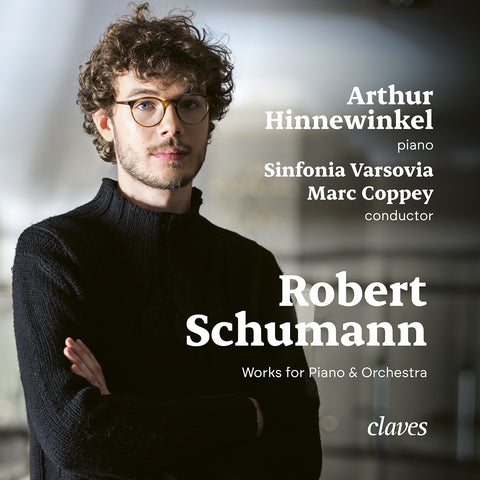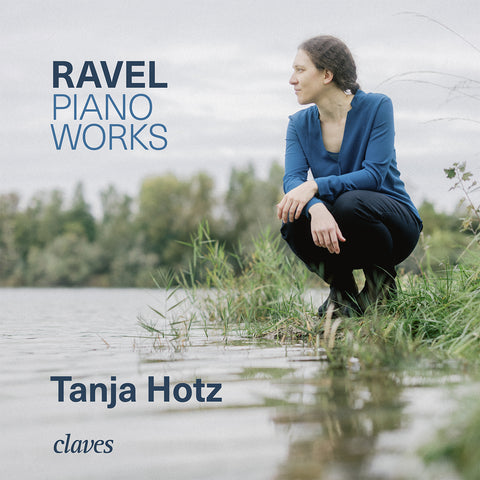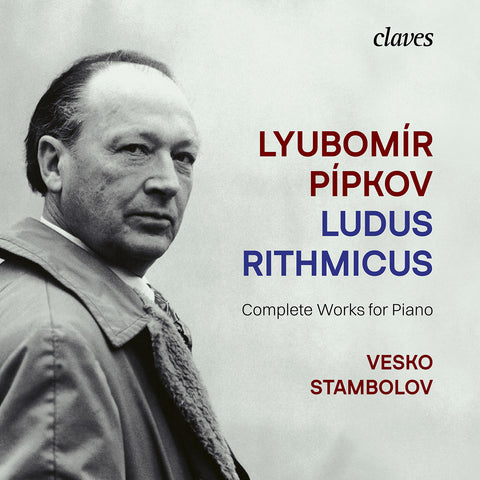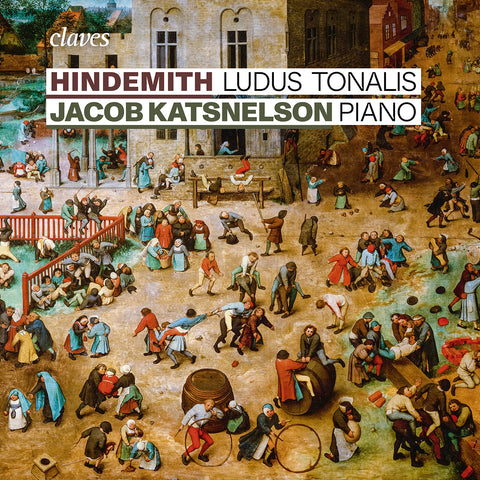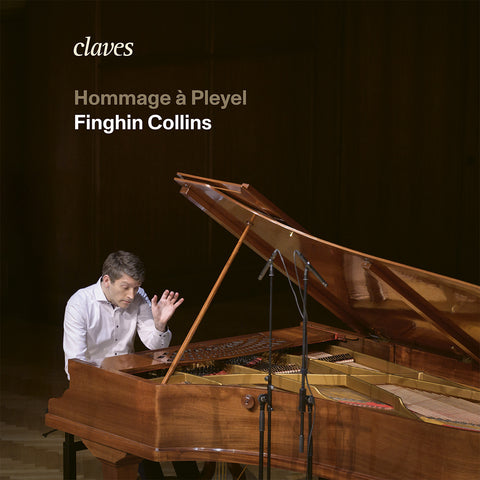(2025) ROmerican Avant-Garde
Category(ies): Piano Rarities
Instrument(s): Piano
Main Composer: Various composers (see collections)
CD set: 1
Catalog N°:
CD 3133
Release: 10.10.2025
EAN/UPC: 7619931313320
This album is now on repressing. Pre-order it at a special price now.
CHF 18.50
This album is no longer available on CD.
This album has not been released yet. Pre-order it from now.
CHF 18.50
This album is no longer available on CD.
CHF 18.50
VAT included for Switzerland & UE
Free shipping
This album is no longer available on CD.
VAT included for Switzerland & UE
Free shipping
This album is now on repressing. Pre-order it at a special price now.
CHF 18.50
This album is no longer available on CD.
This album has not been released yet.
Pre-order it at a special price now.
CHF 18.50
This album is no longer available on CD.
CHF 18.50
This album is no longer available on CD.
ROMERICAN AVANT-GARDE
ROMERICAN AVANT-GARDE
Conceived as a revisited classical piano recital, ROmerican Avant-Garde is a concert-experience lasting about 50 minutes without applause, and almost without interruption between the works.
This unusual musical program dedicated to the piano presents a mélange of powerful avant-garde works by some of the greatest American composers, punctuated by Romanian pieces in a surprising transatlantic cultural bridge.
It is centered around a work conceived and premiered in Paris (Europe) in 1955 and rarely performed in the United States: The Seven Deadly Sins by Jacob Druckman.
ABOUT THE PROJECT
The first two years of the Covid-19 pandemic caused a brutal halt to face-to-face cultural events - in particular, to live performances. Even after health restrictions were eased, audiences were reluctant to return for a quite some time; some never returned to concerts at all, which speaks to the fragility and fluidity of nowadays audiences.
During this tough period, the following thought came to me: “In view of the habits that have radically changed since the beginning of the pandemic, I see here an opportunity to change the way I give classical piano recitals in order to make them accessible to a new audience beyond the habitual traditional music lovers.” This thought was the impetus for the concept of ROmerican Avant-Garde.
The choice to associate an American repertoire with Romanian works allows us to highlight the cultural links that have always existed through music, despite wars, distance and social upheaval. George Enescu’s nocturnal nostalgia in Romania during World War I resonates with John Cage’s post-war imaginary landscapes in New York in 1948, as Jacob Druckman’s 1955 atonal rebellion in Paris can resonate with a 21st century audience going through a period of profound and constant transformation. Today’s audience is more and more concerned about the current dramatic global situation that humanity is facing, and it participates actively in its improvement.
THE PROGRAM
The audacious works proposed by ROmerican Avant-Garde explore emotional themes ranging from anger to dreams, to rebelliousness, with a touch of nostalgia from Eastern Europe as well as a post-war America.
Echoing our 21st century identity crisis, this program testifies to the need for a fresh, more daring approach.
THE WORKS AS A FUSION
One of the principal American composers of the second half of the 20th Century, Jacob Druckman is considered one of the greatest orchestrators of his generation. The Seven Deadly Sins is his only known piece for solo piano. Composed in Europe - more specifically in Paris - this work might represent an experimental plain for the composer, who continued to try out new forms, techniques and styles of composition upon his return to the U.S.
Adept in the atonal style all the while including reminiscences of tonality which are magistrally “hidden” in his musical discourse, Druckman finds his principal sources of inspiration in the music of Igor Stravinsky and Aaron Copland – with whom he studied composition at Tanglewood. Beginning in the 1960s, the American composer became impassioned with electronic music and the theatrical aspect of music, two elements that will contribute to the originality of his future musical creations.
John Cage, an emblematic composer of American experimental music, adept in the dissonant style, and of the prepared instrument, is represented in the program by an early work, rarely played in public and very surprising in its melodicity: In a Landscape. This piece, written in 1948, is reminiscent of a meditation; it was composed during a period of profound questioning in the composer’s life, a period during which he became involved in Zen culture and wrote another work in the same style: Dream.
In this program, In a Landscape symbolizes the opening towards an imaginary world that is sometimes burlesque -- at once grotesque and sweetly nostalgic.
Remus Georgescu, renowned Romanian conductor and composer is represented in this context of avant-garde by Three Miniatures for piano, compositions extracted from his early Suite No. 1 for piano, that are close to Béla Bartók and Igor Stravinsky’s music, dissonant and very rhythmically dynamic music, which expresses a great inner freedom.
Consequently, the respective atmospheres proposed by these short pieces are diverse, passing through the mystery of nocturnal life and the ambiguity of dreams/nightmares (Berceuse), postromantic nostalgia (Sicilienne) and caricature (Marche). The association with Druckman’s work is therefore obvious. These Three Miniatures, which follow the opening work (Cage’s In a Landscape), play the role of preparing the listener’s ear, and gradually lead her, him or them, towards the fantastical reality of the post-war world (1955).
The third American composer, who completes the program, Aaron Copland, nicknamed the dean of American composers, is one of the most original and influential composers of the 20th century. Having studied composition with Nadia Boulanger in Paris for three years, his vast musical creation is interwoven with surprising mixtures of the artistic currents of the moment (such as jazz music, post-impressionism or neoclassicism) as well as the new musical languages with which the most “rebellious” composers experimented at the beginning of the 20th century: serial music, atonality, new sounds and effects produced on traditional instruments, etc.
As if in an avant-garde poem, almost out of context and in a fleeting manner, Leonard Bernstein “intervenes” and pays tribute to them teacher and friend, Aaron Copland, with the miniature entitled For Aaron Copland. This work is taken from the collection of Seven Anniversaries, which includes seven works for solo piano written between 1942-43.
These short pieces represent a musical gift for the birthday of each friend of the composer. The “miniature” character is again used to prepare for the entrance, this time, of Copland’s Four Piano Blues.
The last piece in this musical “collage” is Carillon Nocturne, by the renowned Romanian composer George Enescu. Inspired by Romanian folk music, the impressionist movement and, later, by Eastern music, Enescu creates his own language by finding the perfect balance between his sources of inspiration and his own musical intuition.
Through a unique representation of bells and chimes, this work suggests an atmosphere of tranquility and stability at the end of the program, which allows the audience to gently reconnect with itself.
The dissonances are no longer the real harmonic conflicts of The Seven Deadly Sins, but rather a faithful representation of the natural resonances of the bells, at once high and at the same time deep, produced this time by the piano.
DINU MIHĂILESCU
Born in Romania in 1988 into a musical family, pianist Dinu Mihailescu is established in Lausanne (Switzerland) since 2020.
During his academic career, he studied at the Haute Ecole de Musique in Geneva having had as mentors Prof. Dominique Weber and Cédric Pescia. He also had the opportunity to study with renowned pedagogues such as Leon Fleisher, Dmitri Bashkirov, Menahem Pressler and Paul Coker.
He is a PhD holder thanks to his doctoral research on a specific repertoire for piano by Béla Bartók.
Dinu has performed as a concert artist with the main orchestras in Romania, as well as with the Orchestra of the HEM of Geneva and the Orchestra of the Festival of Gijón-Candás. He was invited to perform in renowned international festivals such as the Verbier Festival UNLTD, Lavaux Classic, Millennium Piano Festival of Gijón (Spain), Puplinge Classique (Switzerland) among other.
In Switzerland, he has performed in important venues such as the Menuhin Forum in Bern, the Victoria Hall in Geneva, the Ansermet Studio of the Swiss Radio and Television (Geneva), the Franz Liszt Hall of the Conservatoire de Musique and Alhambra in Geneva.
He toured in the U.S. at MSU’s Cook Hall, Detroit’s Steinway Gallery Hall and New York’s RCI.
In 2021, with his duo OXY MORE he recorded a CD with an innovative repertoire for 2 pianos, at the Rosey Concert Hall in Rolle (Switzerland). The duo collaborated in 2024 with the renowned Korean jazz singer Youn Sun Nah in a cross-over project combining classical and jazz.
This talented young musician has also been awarded numerous prizes, within the most relevant are the 2nd Prize at the International “Béla Bartók” Piano Competition in Szeged (Hungary, 2017), and the Rotary Club Award for Excellence for his participation in Art and Culture in Romania.
Dinu Mihailescu is combining his career as a performer with teaching, being a piano faculty at the Popular Conservatory of Music, Dance and Theater in Geneva and at the Music School of Lausanne (Switzerland), and he is increasingly dedicated to mixing classical and modern repertoire with contemporary piano repertoire.
In October 2025 he will perform the ROmerican Avant-Garde program at Carnegie Hall’s Weill Recital Hall.
REVIEWS
"Le disque croise de courtes pièces pour piano de compositeurs étatsuniens et roumains du XXe siècle, John Cage (In a Landscape), Bernstein (Sept anniversaires), Copland (Quatre blues), Georgescu (Trois miniatures), Enesco (Carillon nocturne). Son ambition est de dresser un pont, d’imaginer un moment musical moins formel, d’un seul souffle, autour d’une œuvre rare, Les sept péchés capitaux de Jacob Druckman, pour un public qui n’a pas besoin d’avoir des références «classiques»." - Elisabeth Haas, octobre 2025
"Conçu par le pianiste roumain Dinu Mihailescu ce programme s'articule autour de pièces de compositeurs américains et roumains de la première moitié du 20ème siècle. Il a également un versant performatif puisqu'il se joue en concert sans interruption et sans applaudissement. [..] Dernier exemple de ce collage musical concocté par le pianiste : le "Carillon Nocturne" issu de la Suite op. 18 de Georges Enescu, pépite isolée mais qui constitue une merveilleuse conclusion à un programme rare et fastueux." - Jérôme Angouillant, novembre 2025
"Formé par Dominique Weber et Cédric Pescia à la Haute école de musique de Genève, Dinu Mihailescu (né en 1988) jette des ponts entre deux continents et deux époques. Deux compositeurs roumains audacieux et quatre avant-gardistes américains y partagent leur « envie de renouveau ». [..] Jacob Druckman (1928-1996) fut, lui aussi, un élève de Copland. Nichés au cœur du programme, ses Sept Péchés capitaux étonnent : créés à Paris en 1955, ils demeurent inexplicablement dans l’ombre. Le premier mouvement (Orgueil), avec ses effets de résonnance, prolonge l’univers d’Enesco en lui donnant des allures aussi grandioses qu’impérieuses. Le troisième, qui combine Avarice, Gourmandise et Luxure, brille par son invention : après avoir englouti le clavier, la musique s’alourdit comme sous l’effet d’un ballonnement grotesque, avant de se ruer de nouveau avec un appétit vorace. C’est la pépite de cet album singulier, défendu avec autant de talent que de conviction." - Bertrand Boissard, Décembre 2025
ROMERICAN AVANT-GARDE
Conceived as a revisited classical piano recital, ROmerican Avant-Garde is a concert-experience lasting about 50 minutes without applause, and almost without interruption between the works.
This unusual musical program dedicated to the piano presents a mélange of powerful avant-garde works by some of the greatest American composers, punctuated by Romanian pieces in a surprising transatlantic cultural bridge.
It is centered around a work conceived and premiered in Paris (Europe) in 1955 and rarely performed in the United States: The Seven Deadly Sins by Jacob Druckman.
ABOUT THE PROJECT
The first two years of the Covid-19 pandemic caused a brutal halt to face-to-face cultural events - in particular, to live performances. Even after health restrictions were eased, audiences were reluctant to return for a quite some time; some never returned to concerts at all, which speaks to the fragility and fluidity of nowadays audiences.
During this tough period, the following thought came to me: “In view of the habits that have radically changed since the beginning of the pandemic, I see here an opportunity to change the way I give classical piano recitals in order to make them accessible to a new audience beyond the habitual traditional music lovers.” This thought was the impetus for the concept of ROmerican Avant-Garde.
The choice to associate an American repertoire with Romanian works allows us to highlight the cultural links that have always existed through music, despite wars, distance and social upheaval. George Enescu’s nocturnal nostalgia in Romania during World War I resonates with John Cage’s post-war imaginary landscapes in New York in 1948, as Jacob Druckman’s 1955 atonal rebellion in Paris can resonate with a 21st century audience going through a period of profound and constant transformation. Today’s audience is more and more concerned about the current dramatic global situation that humanity is facing, and it participates actively in its improvement.
THE PROGRAM
The audacious works proposed by ROmerican Avant-Garde explore emotional themes ranging from anger to dreams, to rebelliousness, with a touch of nostalgia from Eastern Europe as well as a post-war America.
Echoing our 21st century identity crisis, this program testifies to the need for a fresh, more daring approach.
THE WORKS AS A FUSION
One of the principal American composers of the second half of the 20th Century, Jacob Druckman is considered one of the greatest orchestrators of his generation. The Seven Deadly Sins is his only known piece for solo piano. Composed in Europe - more specifically in Paris - this work might represent an experimental plain for the composer, who continued to try out new forms, techniques and styles of composition upon his return to the U.S.
Adept in the atonal style all the while including reminiscences of tonality which are magistrally “hidden” in his musical discourse, Druckman finds his principal sources of inspiration in the music of Igor Stravinsky and Aaron Copland – with whom he studied composition at Tanglewood. Beginning in the 1960s, the American composer became impassioned with electronic music and the theatrical aspect of music, two elements that will contribute to the originality of his future musical creations.
John Cage, an emblematic composer of American experimental music, adept in the dissonant style, and of the prepared instrument, is represented in the program by an early work, rarely played in public and very surprising in its melodicity: In a Landscape. This piece, written in 1948, is reminiscent of a meditation; it was composed during a period of profound questioning in the composer’s life, a period during which he became involved in Zen culture and wrote another work in the same style: Dream.
In this program, In a Landscape symbolizes the opening towards an imaginary world that is sometimes burlesque -- at once grotesque and sweetly nostalgic.
Remus Georgescu, renowned Romanian conductor and composer is represented in this context of avant-garde by Three Miniatures for piano, compositions extracted from his early Suite No. 1 for piano, that are close to Béla Bartók and Igor Stravinsky’s music, dissonant and very rhythmically dynamic music, which expresses a great inner freedom.
Consequently, the respective atmospheres proposed by these short pieces are diverse, passing through the mystery of nocturnal life and the ambiguity of dreams/nightmares (Berceuse), postromantic nostalgia (Sicilienne) and caricature (Marche). The association with Druckman’s work is therefore obvious. These Three Miniatures, which follow the opening work (Cage’s In a Landscape), play the role of preparing the listener’s ear, and gradually lead her, him or them, towards the fantastical reality of the post-war world (1955).
The third American composer, who completes the program, Aaron Copland, nicknamed the dean of American composers, is one of the most original and influential composers of the 20th century. Having studied composition with Nadia Boulanger in Paris for three years, his vast musical creation is interwoven with surprising mixtures of the artistic currents of the moment (such as jazz music, post-impressionism or neoclassicism) as well as the new musical languages with which the most “rebellious” composers experimented at the beginning of the 20th century: serial music, atonality, new sounds and effects produced on traditional instruments, etc.
As if in an avant-garde poem, almost out of context and in a fleeting manner, Leonard Bernstein “intervenes” and pays tribute to them teacher and friend, Aaron Copland, with the miniature entitled For Aaron Copland. This work is taken from the collection of Seven Anniversaries, which includes seven works for solo piano written between 1942-43.
These short pieces represent a musical gift for the birthday of each friend of the composer. The “miniature” character is again used to prepare for the entrance, this time, of Copland’s Four Piano Blues.
The last piece in this musical “collage” is Carillon Nocturne, by the renowned Romanian composer George Enescu. Inspired by Romanian folk music, the impressionist movement and, later, by Eastern music, Enescu creates his own language by finding the perfect balance between his sources of inspiration and his own musical intuition.
Through a unique representation of bells and chimes, this work suggests an atmosphere of tranquility and stability at the end of the program, which allows the audience to gently reconnect with itself.
The dissonances are no longer the real harmonic conflicts of The Seven Deadly Sins, but rather a faithful representation of the natural resonances of the bells, at once high and at the same time deep, produced this time by the piano.
DINU MIHĂILESCU
Born in Romania in 1988 into a musical family, pianist Dinu Mihailescu is established in Lausanne (Switzerland) since 2020.
During his academic career, he studied at the Haute Ecole de Musique in Geneva having had as mentors Prof. Dominique Weber and Cédric Pescia. He also had the opportunity to study with renowned pedagogues such as Leon Fleisher, Dmitri Bashkirov, Menahem Pressler and Paul Coker.
He is a PhD holder thanks to his doctoral research on a specific repertoire for piano by Béla Bartók.
Dinu has performed as a concert artist with the main orchestras in Romania, as well as with the Orchestra of the HEM of Geneva and the Orchestra of the Festival of Gijón-Candás. He was invited to perform in renowned international festivals such as the Verbier Festival UNLTD, Lavaux Classic, Millennium Piano Festival of Gijón (Spain), Puplinge Classique (Switzerland) among other.
In Switzerland, he has performed in important venues such as the Menuhin Forum in Bern, the Victoria Hall in Geneva, the Ansermet Studio of the Swiss Radio and Television (Geneva), the Franz Liszt Hall of the Conservatoire de Musique and Alhambra in Geneva.
He toured in the U.S. at MSU’s Cook Hall, Detroit’s Steinway Gallery Hall and New York’s RCI.
In 2021, with his duo OXY MORE he recorded a CD with an innovative repertoire for 2 pianos, at the Rosey Concert Hall in Rolle (Switzerland). The duo collaborated in 2024 with the renowned Korean jazz singer Youn Sun Nah in a cross-over project combining classical and jazz.
This talented young musician has also been awarded numerous prizes, within the most relevant are the 2nd Prize at the International “Béla Bartók” Piano Competition in Szeged (Hungary, 2017), and the Rotary Club Award for Excellence for his participation in Art and Culture in Romania.
Dinu Mihailescu is combining his career as a performer with teaching, being a piano faculty at the Popular Conservatory of Music, Dance and Theater in Geneva and at the Music School of Lausanne (Switzerland), and he is increasingly dedicated to mixing classical and modern repertoire with contemporary piano repertoire.
In October 2025 he will perform the ROmerican Avant-Garde program at Carnegie Hall’s Weill Recital Hall.
REVIEWS
"Le disque croise de courtes pièces pour piano de compositeurs étatsuniens et roumains du XXe siècle, John Cage (In a Landscape), Bernstein (Sept anniversaires), Copland (Quatre blues), Georgescu (Trois miniatures), Enesco (Carillon nocturne). Son ambition est de dresser un pont, d’imaginer un moment musical moins formel, d’un seul souffle, autour d’une œuvre rare, Les sept péchés capitaux de Jacob Druckman, pour un public qui n’a pas besoin d’avoir des références «classiques»." - Elisabeth Haas, octobre 2025
"Conçu par le pianiste roumain Dinu Mihailescu ce programme s'articule autour de pièces de compositeurs américains et roumains de la première moitié du 20ème siècle. Il a également un versant performatif puisqu'il se joue en concert sans interruption et sans applaudissement. [..] Dernier exemple de ce collage musical concocté par le pianiste : le "Carillon Nocturne" issu de la Suite op. 18 de Georges Enescu, pépite isolée mais qui constitue une merveilleuse conclusion à un programme rare et fastueux." - Jérôme Angouillant, novembre 2025
"Formé par Dominique Weber et Cédric Pescia à la Haute école de musique de Genève, Dinu Mihailescu (né en 1988) jette des ponts entre deux continents et deux époques. Deux compositeurs roumains audacieux et quatre avant-gardistes américains y partagent leur « envie de renouveau ». [..] Jacob Druckman (1928-1996) fut, lui aussi, un élève de Copland. Nichés au cœur du programme, ses Sept Péchés capitaux étonnent : créés à Paris en 1955, ils demeurent inexplicablement dans l’ombre. Le premier mouvement (Orgueil), avec ses effets de résonnance, prolonge l’univers d’Enesco en lui donnant des allures aussi grandioses qu’impérieuses. Le troisième, qui combine Avarice, Gourmandise et Luxure, brille par son invention : après avoir englouti le clavier, la musique s’alourdit comme sous l’effet d’un ballonnement grotesque, avant de se ruer de nouveau avec un appétit vorace. C’est la pépite de cet album singulier, défendu avec autant de talent que de conviction." - Bertrand Boissard, Décembre 2025
Return to the album | Read the booklet | Open online links | Composer(s): Various Composers | Main Artist: Dinu Mihailescu




STUDIO MASTER (HIGH-RESOLUTION AUDIO)
Aaron Copland (1900-1990)
Amethys Design
Dinu Mihailescu - piano
George Enescu (1881-1955)
High-resolution audio - Studio master quality
In stock
Jacob Druckman (1928-1996)
John Cage (1912-1992)
Leonard Bernstein (1918-1990)
New releases
Piano
Rarities
Remus Georgescu (1932-2021)
Various composers
Aaron Copland (1900-1990)
Amethys Design
Dinu Mihailescu - piano
George Enescu (1881-1955)
High-resolution audio - Studio master quality
In stock
Jacob Druckman (1928-1996)
John Cage (1912-1992)
Leonard Bernstein (1918-1990)
New releases
Piano
Rarities
Remus Georgescu (1932-2021)
Various composers









